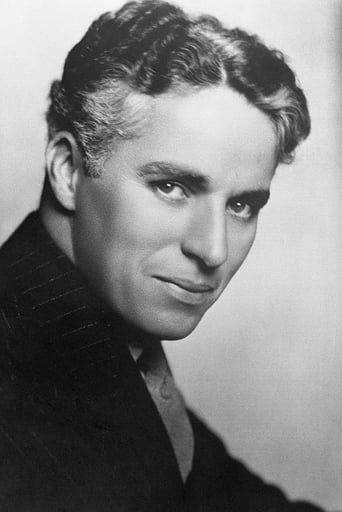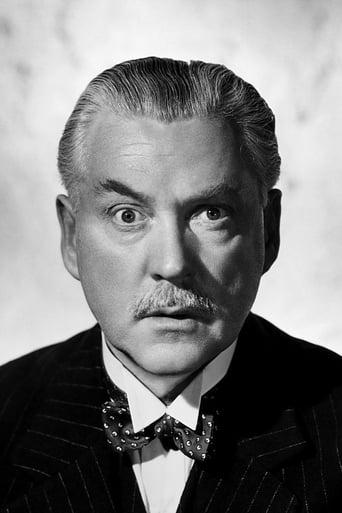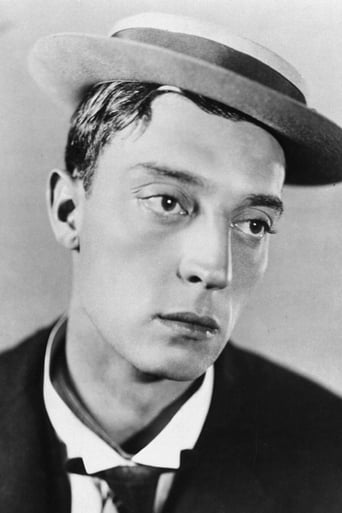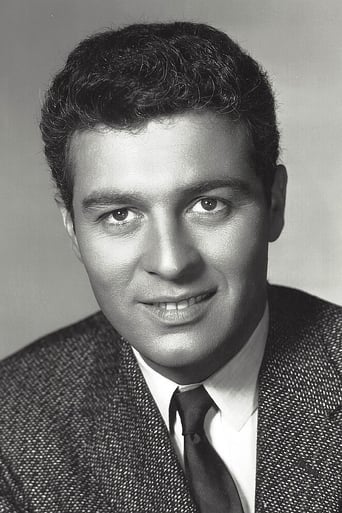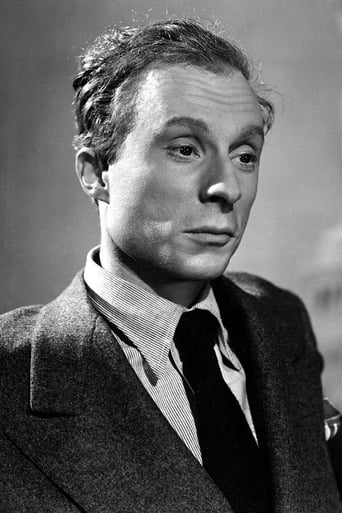Redwarmin
This movie is the proof that the world is becoming a sick and dumb place
Phonearl
Good start, but then it gets ruined
AshUnow
This is a small, humorous movie in some ways, but it has a huge heart. What a nice experience.
Dr Jacques COULARDEAU
It is a masterpiece with some funny scenes, especially at the end, but mostly because of the tremendous empathy this film carries, conveys and communicates about life, about death, about doing something with the life we have been entrusted with, something positive, something that may serve the community, other people, something that provides love to those who need it, who deserve it. It is impossible to tell the story of this film without in many ways destroying it. We are in London just before the First World War and we are in show business with Charlie Chaplin as an old comedian, Calvero; a young dancer, Thereza who has some stage fright problems that paralyze her legs, and is impersonated by Claire Bloom; and a young composer, Neville enacted by Sydney Chaplin. In Calvero's comeback, he will perform with an old partner of his played by Buster Keaton. The interest of the film is its comic dimension intertwined with the dramatic content, with this dancer who has to be supported and even reconstructed in order to be able to use her legs to perfection. Everyone will remember the slap from Calvero in the wings just seconds before she enters the stage when she is having a sudden paralysis fit caused by stage fright. And the slap works because she is so shocked she cannot even think of her legs anymore.Charlie Chaplin after the Second World War seems to be a lot more humane, empathetic with people, individual people, just as if the war had battered him down tremendously and let him sore in his heart and sad in his mind. The big political and social subjects are more or less kept in the past and now he looks at the mental state of human beings in this world that has to be reconstructed after the five years of absolute folly. Maybe McCarthy and his campaign in Hollywood that forced Charlie Chaplin to move back to Great Britain is softening his critical tone.This final period in Charlie Chaplin's creative life is, just the same as with Picasso, different but yet the same as for imagination, creativity, intensity, human sympathy and compassion. I must say that the scene of flea taming is really funny, though I may prefer the final act with Buster Keaton, the grand piano, and the violin. The satire of classical concerts is so strong and to the point: formality and appearances that have to be saved, kept and protected so much that then the music or the performance becomes stiff and even forbidding.To be seen urgently if you haven't already done so. You will all like Calvero's death on stage, or nearly and you will all think of Molière himself, the greatest comedian of all times and one of the best playwrights, who actually died on stage performing a hypochondriac would-be sick man.Dr. Jacques COULARDEAU
gsygsy
Bosley Crowther, the New York Times's movie critic at the time of this movie's release, concluded his review with the words "'Limelight' is a very moving film." To my surprise, I agree with him. Although as it was chugging along, I thought it was often verbose, sluggishly paced, only fitfully amusing, and heavy on philosophising, when its famous theme swelled up in the orchestra for the final scene, I burst into tears. It was evident that Chaplin's tale of age giving way to youth had been quietly working on my feelings. You've got to hand it to the guy: after a lifetime making movies, he knew what he was about.One of LIMELIGHT's most fascinating aspects is Chaplin's take on audiences. We see his hero, the vaudevillian Calvero, play his old act twice: first, in a half-empty, emptying theatre; second, before an enthusiastic packed house. The act, though, is the same: there's no sense of a difference between the way Chaplin/Calvero plays it the first time and the second. The early audience decides it doesn't like it, the later audience decides it does. Such haphazard behaviour would be enough to wear anyone down in any relationship. Chaplin powerfully conveys the emotional cost of being at the receiving end of the public's whims.At the opposite stage of her life is Theresa, a young ballet dancer, whose confidence has left her. Even as the flame of Calvero's own self-respect flickers, he is able to ignite Theresa's. The role was a huge break for Claire Bloom, not an actress for whom I have great admiration, but she does OK here, with youth on her side. Elsewhere, there are such delights as Majorie Bennett, Buster Keaton, and Chaplin's own beautiful score.I don't know whether, when all's said and done, it's a masterpiece or not, and maybe it's helpful to be an old person like me to get the best out of it, but, once seen, it's unforgettable.
ElMaruecan82
"Limelight" is perhaps Charlie Chaplin's most personal movie after "The Kid", and it is no surprise that the film is set in the early century, in London's poorest district, for this setting is instrumental to Chaplin's revisiting the long way he had come ever since he left the town's misery when the century was young and so was he. And if we dared to extend that logic, we'd see in the lucid resignation of Calvero and the acceptation that he is way past his prime, a feeling we have or will all be confronted to when the most of our life will be behind us. "Limelight" is a powerful movie about aging like the master's disciples (and future masters) Fellini or Allen would make in their later years. And it's a Chaplin in his sixties, who can finally take a look back at the old days and ask himself the painful question "Have I still got it?".This makes the context of the film an inevitable key of comprehension: in 1952, the last film made by Chaplin was "Monsieur Verdoux", a smart dark comedy, ahead of its time, about a serial killer that probably took the audience and the critics off guard. Never mind the little peaks of verbal delights the film provided, it was a critical flop. He whom success never deserted ever since he started trolling the Venice auto kids' race in 1914 to his grandiloquent speech in "The Great Dictator" in 1940, the man who became the most instantly recognizable face in the world and the most famous character through his "Little Tramp", had his first missed rendezvous thirty years after his debut.And maybe failure is like some infantile diseases, the later they come, the more devastating they are. With "Monsieur Verdoux"'s ill reception, combined with other personal troubles, and political complications in the midst of the HUAC investigation, Chaplin's legendary aura faded enough to make him undesirable in the very land that made his fortune. Calvero only lost his touch with the public but he doesn't fool us, this is Chaplin as he could have turned out, a veteran clown who used to be a great sensation in the last century but who disappeared and drowned his last hopes and lost dreams in booze. But he's not your usual sad clown, he's quite resigned about himself, so he drinks because being sober makes him somber.Yet, the paradox of Calvero is that he meets a ballerina dancer in a worst medical condition and mental shape. Thereza just attempted suicide, and he saves her life, takes care of her, provides her medical support, food and water, and maybe more valuable assets: encouragement. Thereza, played by Claire Bloom, has lost faith on her talent after a long disease and she's so lacking in confidence she can't even feel her legs. This is the magic of these two outcasts' reunion. One is resigned about the past, one is scared about the future, together their present gets more meaningfulness. One of the film's best scenes is when she's just about to dance but she's stricken by stage fright, he gives him a slap that feels around the world, and her career is launched. The power of "Limelight" is that just when you fear the film becomes too sentimental, you get such similar "slaps". And it never falls in the trap of the love story either (one could fear it given Chaplin's "tastes") but while Thereza is in love with Calvero, he knows this is not meant to happen. It's a fatherly love and it is always about the show. The film is punctuated with many musical acts from Charlie Chaplin, some are imaginary and meet with laughs, they sometimes meet with silence, and naturally, there's this terrible moment when there's no laugh and it's much real. It is a flop, and the devastated face of Calvero at the time where he put his makeup out is just that moment every artist fears. This is the heart of the film, the moment that reveals its cathartic nature, Chaplin exorcises his inner demons and makes a successful story out of failure, and within the story, Calvero's own failure indirectly fuels Thereza with self-confidence and energy. Calvero isn't a frustrated man and acknowledges the talent when he sees it. He leaves Thereza to her dancing and a blooming romance with Neville (a pianist played by Chaplin's son) because he knows it's time to pass the torch. That's how life is done. But the film can't afford to be tragic because the comedy isn't prevalent either, so it finds the perfect note to conclude.One of the film's great offerings, besides Chaplin's autobiographical torments, is the cameo of another silent comedy giant: Buster Keaton, in a role that finally compensates the "wax figure" joke from "Sunset Blvd.". Together, they play a funny and frenetic musical act that suck life out of Calvero. The film closes on his farewell to Theresa, the audience, he dies on stage like a soldier on the battlefield. He surrenders to self-destruction so his heart can never be destroyed by failure.. As he said "I hate the sight of blood, but I can't deny it's pumping on my veins" (and this quote alone proves what a terrific screenwriter Chaplin was).In fact, the film is a wonderful combination of talents from writing to acting, even the musical score is penetrating, and it won the Oscar twenty years after, over "The Godfather" (ineligible because of some technicality). I wonder what reception the film would have gotten from the Academy, if it wasn't boycotted, 1952 was full of film centering on show-business: "The Bad and the Beautiful", "Moulin Rouge", 'Singin' in the Rain" and it was the circus-themed "The Greatest Show on Earth" that won the Best Picture Oscar. So, maybe a film about (and made by) the greatest showman on Earth would have generated the thunderous claps it deserved.
Anssi Vartiainen
Charlie Chaplin is one of those figures that are so legendary in cinema nowadays that you're pretty much expected to know them. And also to love them. So is it wrong for me to say that I found this movie to be meandering and overly simplistic and long?I can still safely say that I liked it and I don't regret seeing it, but a lot of its running time is spent simply looking at Chaplin's clown routines on stage. Some of them are funny, most got me to smile, but none of them made me laugh. And I guess that's the problem. Humour is often heavily subjective and tied to culture, and thus to time. Some jokes and gags remain timeless, most do not.But luckily for me this is more than a comedy, though it is about comedy. It tells the story of one Calvero (Chaplin), a famous clown back in his glory days, who has now been reduced to a miserable drunk, reminiscing the days when a mere twitch of his eyebrow caused people to fall off their chairs. Enter Terry (Claire Bloom), a young dancer-to-be, who eventually, through miscellaneous happenstances, becomes something of a protégé for Calvero. It's a sweet little story, though it offers no surprises for a savvy viewer. Though that's not really the point. Its purpose is more reflective. Chaplin's own career was largely over at this point and it'd be hard not to draw comparisons, though the man himself claims it's not about him.In the end I'm in something of a bind. I like the reflective mood of the film, I like its thematics and I do like Bloom and Chaplin's chemistry together. But the overly long clown routines, the meandering dialogue scenes and the haphazard pacing mean that I can't call this a great movie. Still worth a watch though if you're into Chaplin.





